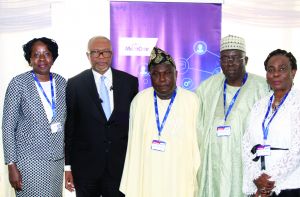
The Senate Committee on Information and Communications Technology (ICT) and Cybercrime has pledged its readiness to work with relevant agencies to ensure that Nigeria meets its ICT objectives considering the incredible capacity already available in the country. The Committee Chairman, Senator Buhari Abdulfatai made the pledge yesterday while leading a high level delegation on a working visit to MainOne’s Data Center, MDXi in Lagos recently.
The Committee commended the incredible capacity available on MainOne’s submarine cable system and data center, which it acknowledged to represent the most significant infrastructure of its kind in Nigeria. The Committee acknowledged that with this capacity already available in the country, there is no reason for the country’s broadband penetration rate to remain at the 21% reported by the Nigerian Communications Commission (NCC), given the booming demand for data and connectivity services. Senator Abdulfatai stated that the delay in licensing Infrastructure Companies and deploying network infrastructure after licensing posed a major threat to the achievement of the nations’ technology goals, which largely depends on broadband infrastructure to be provided by InfraCos. He assured that the Senate will do all it can within its powers to facilitate ICT/broadband development and give legal substance to ICT policies including the National Broadband Plan and the Cybercrime Act.
During the tour of the facility, Senator Abdulfatai described MainOne’s data center as a world-class facility and reiterated the importance of having Nigerian institutions host data locally within the country in order to ensure National security, drive job growth, improve the quality of online services and guarantee Nigeria’s participation in the emerging global digital transformation.
In her remarks, MainOne’s Chief Executive Officer, Funke Opeke lauded the Senate Committee’s efforts in ensuring the development of ICT across the country via its support of homegrown enterprises and called for legislation especially in the areas that will positively impact on infrastructure development including possible interventions to address the high cost of Capital crippling telecoms companies which has significantly slowed down new infrastructure projects in Nigeria. According to her, this is critically needed in bridging the gnawing gaps in the ICT industry.
“Nigerian content is arguably the most globally recognized African content today, but South Africa and Kenya are perceived as digital leaders in Africa because of the infrastructural gaps in the country. MainOne has made significant investments in ICT infrastructural development in Nigeria and West Africa and will continue to do so, but we require full government support to enable the ICT industry in Nigeria surpass other countries”, she added.






